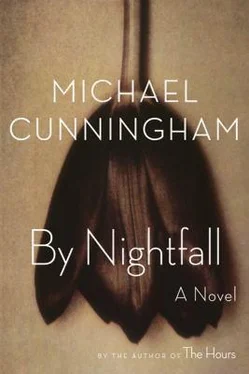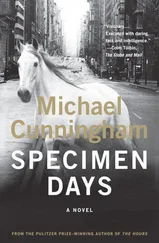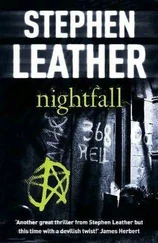Now that he’s on the other side of Broadway, now that Cowboy Boots and his laughing wife have veered south, isn’t he moving step by step closer to the Lower East Side, a neighborhood in which he himself is every bit as bourgeois; every bit as pompously, cluelessly dressed? He lives in a goddamned loft in SoHo (how eighties is that?), he has employees, and up ahead, mere blocks away, there are gaggles of young headbangers who live in walk-ups, who are buying beer with their actual last dimes. Do you imagine, Peter, that your Carpe Diem boots would look any less deluded to them than that guy’s Tony Lamas do to you? There’s a comeuppance for everyone, wherever you are, and the farther you go from your own fiefdom, the more ludicrous are your haircut, your clothes, your opinions, your life. Within easy walking distance of home are neighborhoods that might as well be in Saigon.
Head downtown, then. Toward Tribeca.
What is Bea doing tonight?
Her life has been, for more than a year now, a mystery, and Peter and Rebecca have decided (wrongly?) not to press her for more details than she cares to volunteer. Why did she leave Tufts? She wanted some time off, she’d been in school all her life. Okay, that made sense. Why, of all the places there are to go and the things there are to do, has she elected to work in a hotel bar in Boston, and to live with a strange, older woman who seems to have no occupation at all? That question has been neither asked nor answered. They have faith in her, they’ve elected to have faith in her, though faith can be thin and unsustaining, over time. Worry, of course they worry, but worse than that, they’ve begun to wonder what mistake they made, how they infected their daughter with some virus of the spirit that’s taken twenty-one years to bloom.
The thing with Mizzy has got Peter hopped up.
He takes out his BlackBerry and speed-dials Bea’s number.
He’ll get her voice mail. She picks up for Rebecca on Sundays, she still harbors a fondness for her mother, or at any rate a sense of duty toward her. Otherwise, she never answers. They leave messages occasionally, wait for the Sunday connections.
Tonight, he needs to leave her a message. He needs to leave a bouquet at her doorstep, knowing the flowers will wilt and die there.
Her phone rings five times. And then, as expected:
“Hello, it’s Bea, please leave a message.”
“Darling, it’s your father. I’m just calling to say hey, really. And to tell you…”
Before he can say I love you, she picks up.
“Daddy?”
My God.
“Hey. Hey there. I thought you’d probably be working.”
“They sent me home. It was slow tonight.”
“Well. Hey.”
He’s as nervous as he was the first time he called Rebecca to ask her out. What’s going on here? Bea hasn’t accepted a call from him since she left for college.
“So I’m just home,” she says. “Watching TV.”
He’s on Bowery by now. Where is Bea? In some Boston apartment he’s never seen—she’s made it clear that she doesn’t want to be visited. Impossible not to imagine elderly shag carpeting and stains on the ceiling. Bea doesn’t make much money (refuses help from her parents), and she, the true child of aesthetes, rarely does more to a room than tack up a poster or two. (Does she still put up Flannery O’Connor posing with a peacock, and Kafka’s mild handsome face, or has she moved on to other passions?)
“I’m sorry for calling so late,” he says. “I thought you’d be at work.”
“You called because you thought I wouldn’t answer.”
Think fast.
“I guess I thought I’d just leave a little love note for you.”
“Why tonight?”
He walks down Bowery toward the nameless strip that isn’t quite Chinatown and isn’t Little Italy either.
“I could call any night, sweetheart,” he says. “I guess you’re on my mind tonight.”
No, she’s always on your mind. How can this conversation feel like a date that isn’t going well?
“You’re up late,” she says. “Are you outside? It sounds like you’re outside.”
“Yeah, couldn’t sleep, I’m out for a walk.”
Where he’s walking now it’s just warehouses and shuttered, unprospering shops, wan streetlight shining down onto puddled cobblestones, so silent you can hear a rat browsing through a paper bag on the sidewalk; our own nighttown… no, we’ve got no nighttown, the true squalor, the tranny hookers and the serious drug dealers (not those sad X, coke, smoke? guys you pass in the parks) have been run out, by Giuliani, by the rich; New York still has its desolate stretches but you’re rarely in real danger anymore, no one’s selling heroin out of that gutted building over there, no misshapen beauty with gassed-out eyes is going to offer to blow you for twenty. This is no nighttown and you, sir, are no Leopold Bloom.
“We’re both insomniacs,” she says. “I got that from you.”
Does she mean that as a gesture of affinity, or is she reciting a curse?
“I do wonder why you called me tonight,” she adds.
Oh, Bea, cut me some slack, I’m penitant, I’m penniless, I’m at your mercy. The ratty desolation through which Peter walks builds rather quickly into the outskirts of Chinatown, Manhattan’s only thriving nation-state, the only one that’s growing without the intercession of coffeehouses or cool little bars.
“I told you,” he says. “I was thinking about you. I wanted to leave a message.”
“Are you upset about something?”
“No more than usual.”
“Because you sound like you’re upset about something.”
Peter fights an urge to hang up on her. Who has more power than a child? She can be as cruel as she wants to be. He can’t. Still, impulses run rampant: You’re plain, you’re not that bright, you’re a disappointment. He can’t. He’d never.
“I’m just upset about the usual things. Money, and the end of the world.”
He can’t get flippant with her, won’t even try his seductive wit. This is his daughter he’s talking to.
She says, “Do you need me to send you a check?”
It takes him a moment to realize she’s joking. He snorts out a laugh. If she laughs back, he can’t hear it for the traffic.
He’s crossing Canal now, headed into the lurid neon and fluorescence of Chinatown proper, all gaudy reds and yellows; it’s as if blue isn’t in the spectrum here at all. They never turn the lights off, they don’t take the dangling, stretch-necked cooked ducks out of the windows; as if it possesses a continuing, unquenchable place-life that can be populated or not. A yellow sign says good, just that, and offers by way of demonstration a murky tank full of sluggish, mud brown catfish.
“And, okay,” he says, “your mother’s brother is kind of a big dose.”
“Oh, right, Dizzy. He’s a spoiled brat.”
“That he is.”
“So you thought it would be a nice contrast to talk to your happy, well-adjusted daughter.”
Please, Bea. Please have mercy.
Children don’t. Do they? Did you, Peter, have mercy on your own parents?
Even he doesn’t buy the low chuckle he forces out. “I’d never ask anything as impossible as happy or well-adjusted from you,” he says.
“So it’s a comfort to you, to think of me as unhappy.”
What’s up with you?
“How’s Claire?” The roommate.
“She’s out. It’s just me and the cats.”
He says, “I don’t want you to be unhappy, Bea. I just don’t want to be one of those parents who insist that their kid be, you know, happy all the time.”
“Are we going to have a serious talk?” she says. “Do you want to have a serious talk?”
Читать дальше
Конец ознакомительного отрывка
Купить книгу












